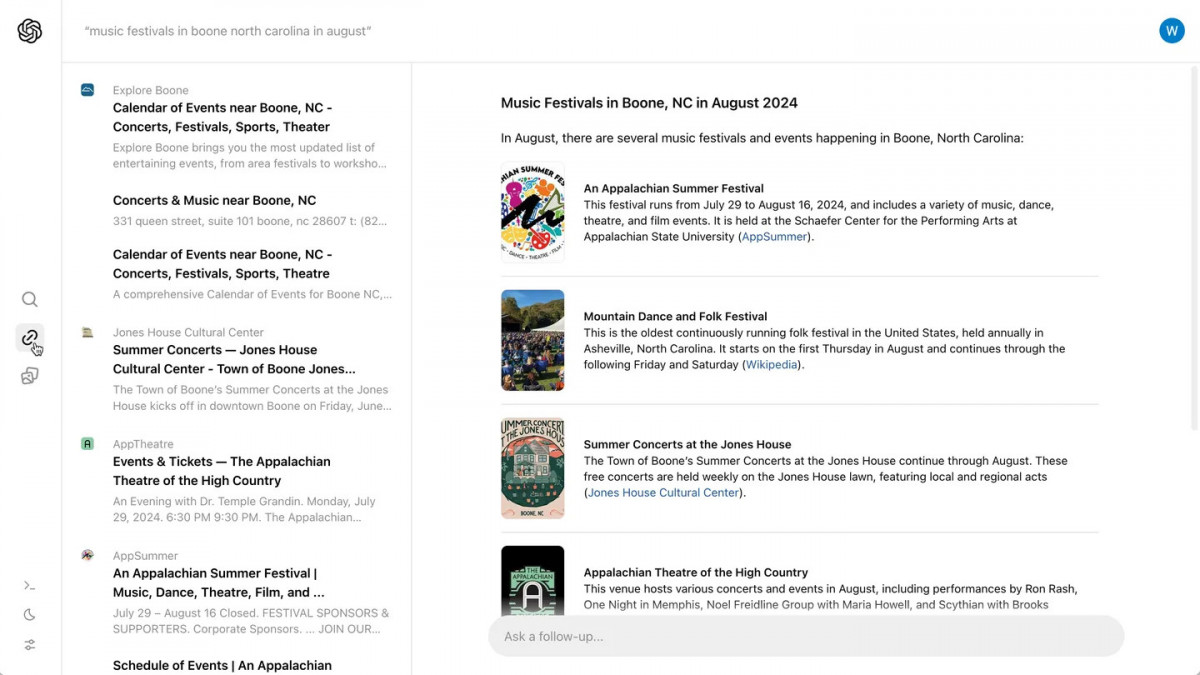Exploring the Digital Horizon: OpenAI’s Ambitious Move to Compete with Google's Market Dominance
Alisa Davidson
With the introduction of SearchGPT, OpenAI has unveiled a cutting-edge AI search engine that poses a real challenge to industry titans like Google.

OpenAI has officially launched SearchGPT, an AI-driven search tool that could very well disrupt the long-standing lead of major search engines like Google, marking a significant leap forward in leveraging AI for everyday internet usage.
Harnessing the advanced capabilities of OpenAI's GPT-4 family of models, SearchGPT aims to redefine the way users interact with search engines. Unlike traditional platforms that typically return a list of links, SearchGPT strives to engage users with answers that feel more conversational and relatable. Its ability to understand and interpret natural language allows users to phrase their queries just like they would in a casual chat.
A Fresh Perspective on Information Sourcing by OpenAI
One of the standout features of SearchGPT is its ability to gather and synthesize information from across the web. Instead of simply presenting a compilation of possibly relevant links, it aims to provide clear explanations and comprehensive summaries based on multiple sources. This method frees users from the burden of endlessly sifting through search results to find the information they seek.
Currently, during this initial prototype phase, SearchGPT is limited to 10,000 beta testers. Before rolling out the technology to a broader audience, OpenAI is using this careful launch strategy to refine the product and gather valuable user insights. The company has indicated that its popular AI chatbot, ChatGPT, will eventually integrate these new search capabilities.
In an era where titans like Google are hastening to embed AI features into their search tools, OpenAI is making its entry. Google is accelerating its efforts to incorporate machine learning and natural language processing in response to the competitive pressure from AI-centric alternatives. This competition underscores the transformative potential of SearchGPT and similar tools in reshaping the industry landscape.
One of the most captivating aspects of SearchGPT is its unique presentation of search outcomes. Users are welcomed with a prompt saying, 'What are you looking for?' displayed prominently in a large text box.

April 25, 2025
After processing the queries, SearchGPT offers a summary of findings, complete with source links for referencing and concise overviews of relevant information. This design enables users to quickly grasp the main points of a topic and, if they wish, dive deeper into more detailed content.
Additionally, the system boasts a follow-up query feature that encourages users to engage in a more interactive and fluid search process. This conversational approach can be particularly beneficial for intricate inquiries or subjects that require exploration from various viewpoints.
In its approach to search, OpenAI emphasizes its commitment to the ethical development and use of AI technology. The organization has made it clear that it sources content directly and collaborates with various partners to build its search results, reinforcing its dedication to ensuring the reliability and accuracy of the information presented.

Know More
Are There Any Issues or Concerns Regarding AI-driven Search Engines?
One of the key concerns surrounding AI-driven search engines is their potential to inadvertently generate or disseminate misinformation. OpenAI appears to be tackling this challenge by ensuring proper attribution and including source links in the responses generated by SearchGPT. This strategy not only supports original content creators and publishers but also aids users in verifying the information they receive.
There has been ongoing dialogue regarding the development of SearchGPT, particularly concerning its effects on content creators and publishers. Some express worry that by delivering information directly in search results, AI-generated summaries could divert traffic away from their websites. In response, OpenAI has stressed its partnerships with news outlets and provided options for publishers to manage their content's visibility within SearchGPT.
According to the organization, publishers retain the option to exclude their materials from being utilized to train OpenAI's models, even though such materials may still be visible in search results. This approach seeks a balance between protecting the rights and interests of content creators while embracing the capabilities of AI.
With SearchGPT, OpenAI has officially entered the realm of search, marking a significant leap in the ongoing integration of AI into everyday digital tools. This technology holds promise for a host of benefits, including enhanced handling of complex queries, quicker access to relevant data, and a more user-friendly search experience.
However, the rise of AI-enhanced search also raises crucial questions about the future direction of online information distribution and retrieval. As these systems progress, topics such as algorithmic bias, data privacy, and the impact on traditional publishing methods will undoubtedly spark ongoing debates.
OpenAI is strategically navigating these challenges with the limited rollout of SearchGPT as a prototype, gathering user feedback and implementing necessary enhancements prior to a broader launch. This thoughtful approach indicates an understanding of the potential implications of integrating such a powerful AI tool into the search sphere.
The conversational nature of this search experience, along with the capacity to absorb and synthesize vast amounts of information, could significantly enhance the efficiency and intuitiveness of information retrieval for users in various contexts.
The launch of SearchGPT also signals the start of intensified competition in an industry often dominated by a few key players. As AI technologies evolve and gain traction, we may witness a shift in the balance of power among search providers, with emphasis on AI capabilities becoming a key differentiator.
Alisa Davidson
April 25, 2025 Press Releases , please remember that the information contained on this page is not intended as legal, tax, investment, financial advice, or any other form of guidance. It's crucial to only invest amounts you can afford to lose and to seek independent financial counsel if you have any uncertainties. For further details, please refer to the terms and conditions and the support resources provided by the issuer or advertiser. MetaversePost is dedicated to delivering accurate and unbiased reporting, but market conditions may change without prior notice.
Business
Victoria is a writer specializing in various technology-related topics, encompassing Web3.0, AI, and cryptocurrencies. Her considerable background enables her to craft insightful articles tailored for a broad audience.
Markets











